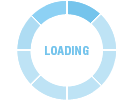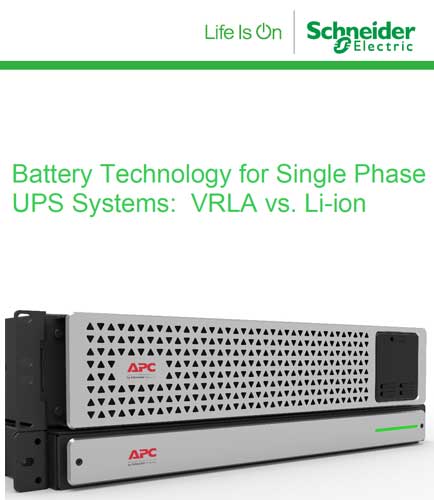
PROCESSING. PLEASE WAIT...


White Paper: Schneider Electric
What is the best Battery Technology for Single Phase UPS Systems?
While Lithium-ion (li-ion) batteries are used commercially for over 20 years in various applications, they have not been commonly adopted as batteries for single-phase UPSs. As of recently, given the requirements set forth by the electric vehicle industry, the decreasing prices of Lithium-ion batteries are now becoming a viable option for UPS applications. The two major drivers for VRLA replacement cycle are the temperature and the charge-discharge cycles. This paper provides a brief overview of li-ion battery characteristics compared to VRLA. It also includes an analysis of the capital cost, operational cost, and total cost of ownership (TCO) between these two battery types.
What are the different types of battery technologies? What are the various parameters to consider while comparing batteries? Will Li-ion battery technology take over VRLA batteries for single phase UPS applications?
Move ahead and read the following whitepaper that will address all your questions, including these:
1. What are the various types of battery technology available for Single Phase UPS Systems?
2. What are the comparison factors to determine the battery performance against investment?
3. How to identify the total cost of ownership (TCO) of batteries by analyzing capital and operational expenses?
4. How are Lithium-ion battery systems poised to eventually replace VRLA technology in the coming decade?
By: NTP Software
Each one of backups, tiering and archiving addresses different aspects of a complete data management solution. Together they address legal, regulatory, information security, and economic concerns. What are the software tools available to address the complications faced in data backup and recovery? The purpose of this white paper is to help you understand how backups, tiering, and archiving technologies differ and how they work together to fight against data loss and meet your business needs in a cost effective manner. Backups offer protection against data loss by providing the means to restore your data after a hardware failure or some other data loss event. Tiering is a strategy for managing the cost of file data. By identifying unused or seldom used files and handling them accordingly, significant saving can be realized. Archiving is necessary for regulatory compliance, provides inexpensive long-term file storage and, if implemented correctly, offers a means of retrieving individual files. Read this White Paper to Dig Deeper on !
By: Revelation Software Concepts
DevOps improves efficiencies by bringing SAP Dev and SAP Ops teams together in the larger business context to coordinate their work throughout the service lifecycle. On large SAP systems, tight integration between components is crucial. The challenge is to leverage, not lose, existing third-party software investments and avoid disrupting user-accepted business processes and procedures. Change Control is emerging as an ideal integration facilitator for automating DevOps in SAP. This whitepaper “Automating DevOps in SAP: Change Control Software as Integration Facilitator”: Focuses on integrating all the links in your DevOps, Agile development, and change control chains Sees how ready-to-use integrations will help leverage such key applications as service desks, code inspection, ALM analysis, testing and quality assurance tools along with the likelihood of DevOps success Focuses on implementation of the DevOps approach, SAP Change Control Software and DevOps Strategies
By: Zeenyx Software
Vendors of Point of Sale (POS) software, system integrators and retailers who develop or customize packaged solutions should make implementing test automation a priority in their testing organizations. Effective...


 2026 All Rights Reserved | by: www.ciowhitepapersreview.com
2026 All Rights Reserved | by: www.ciowhitepapersreview.com